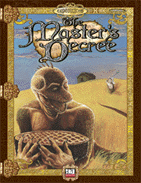
|
About OgreCave and its staff
|

|
by Cedric Chin
The Master's Decree presents six adventures centered around eliminating kobold - and other - threats near the town of Westbrook. This adventure book follows Westbrook as it grows from a small stopover between towns to a trade city. The Master's Decree follows Beginnings: Westbrook, which introduced Westbrook as a small town, but Beginnings is not necessary to play the adventures.
Layout & Art The art, by Kirk Kugel, Alex McVey, and Charlie Schultz, is standard RPG game art. I particularly liked Kugel's "pencil" art of the NPCs in the NPC Statistics section. Most art is full-page sized, roughly two pieces of art for each of the six chapters. I'm not sure if they were intended as game aids, but they can easily be used as such: Bend the book backwards or photocopy the page, and hide the caption. Munchkins who assume every visual aid is important may be thrown off by this technique, though.
Setting the scene Chapter Three features three independent side-treks: an Ogre Lair, a Pixie Glade, and the Spider's Cave. The Ogre Cave and Spider's Lair are short combat-oriented adventures (CR3 or so), to fill up the last half hour or hour of an evening's gaming. The Pixie Glade is more of an NPC non-combat encounter, which may be tied to the Spider's Cave. Oddly, the Spider's Cave contains a magical item worth over 125,000 gold pieces (its magical abilities are unlocked as the character increases in level), but you could always remove it and save it for a later adventure.
Meet the neighbors While the Itlik Igix may not to stray too far from typical kobolds, the Axt Tekti (Chapter Five) are definitely different, with their magic and faction in-fighting. The leader Rixt has cleverly convinced the rest of his tribe that he can communicate with The Forest Lord, a deity of his own creation (!). On top of this, on a raid of an abandoned monastary, he found a magic circlet which he found greatly influenced his fellow kobolds. But Tixit, another magic-using kobold, attempted to expose his rival. The plan failed, and Tixit has fled to a watchtower close to the humans. Rixt was attempting to hunt down Tixit. However he has been sidetracked by his desire for more of a delicious human food: chicken. The intelligence of Rixt has resulted in a lair full of the traps kobolds are known for, and the use of poisoned darts. His interest in finer foods led to the capturing of townsfolk children. Still, these are kobolds, and it's a little sad to know their unique "civilization" will flee from the PC adventurers. The abandoned monastary found by Rixt is Githil Adlan, detailed in Chapter Six. Originally devoted to the worship of nature, Adlan was abandoned and, generations later, taken by the Hisrin Aroth. Eventually these dark priests were slain, and the cult lost to history. The folk of Westbrook do not know of the monastary, and it's up to the party to enter it. The crypt does not disappoint: it contains the undead, magical beasts, and aberrations you'd expect from this sort of place.
The Master's in the details Given how well the rest of the book was laid out, I was actually somewhat disappointed with Appendix B, which uses standard RPG statblocks for NPCs. Personally, I don't like statblocks because they sacrifice readability for compacting information. Particularly because no two NPCs are alike, I really would have liked to see character sheets for the NPCs in this section most likely to see combat (ie. NPCs you could give to the players if they didn't provide their own characters). But this is my personal preference, and the book does follow the widely accepted format. Appendix C contains a miscellany of new monsters and items: The Fell Template, for creating fallen versions of common animals; Illuminating Manuscripts, books of great knowledge which will raise skill levels; the Stonethrasher, a new beast; and Redrut, a poisonous plant used as an ingredient.
Propping things up The book ends with a one-page index, OGL license, and a breakdown of the stat blocks in the back cover. I should mention that the book uses a few creatures from Necromancer Game's Tome of Horrors and Tome of Horrors II (Crypt Thing, Gutslug, Lurker Above, Memory Moss), and Atlas Games' Penumbra Fantasy Bestiary (Hunter Bush), though neither is necessary to run the adventure. Also, the book conveniently includes Condition Summary notes, such as the effects of sickness, nausea, and being shaken and frightened, where needed.
Conclusions
|
||
 The Master's Decree
The Master's Decree